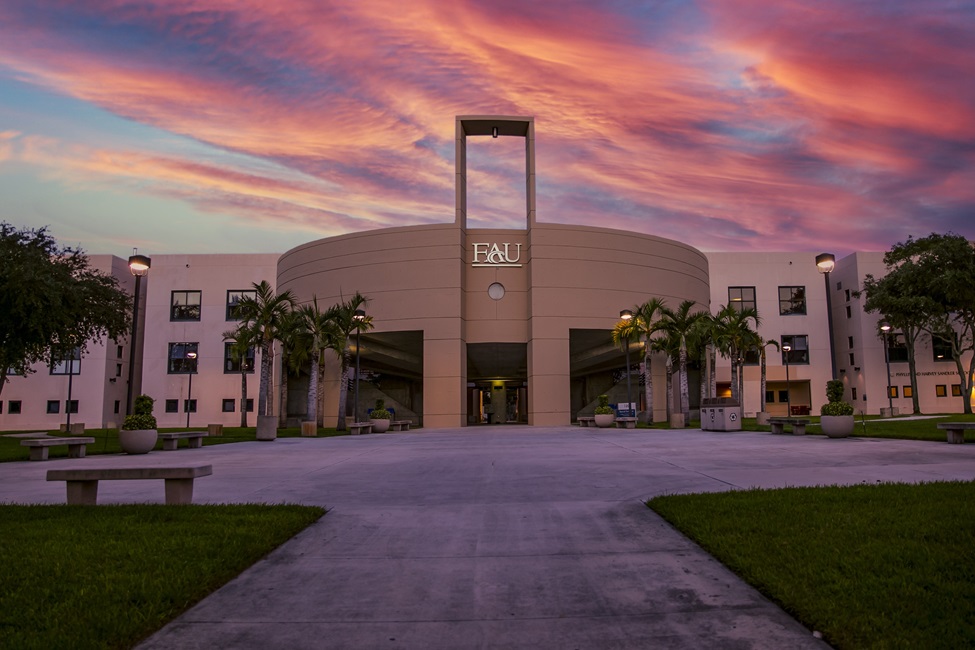FAU Launches 'Center for Integrated Recovery and Wellness Studies'

(Photo by Alex Dolce)
In a glimpse into the nation’s health, the 2023 National Survey on Drug Use and Health reveals the staggering toll of substance use disorders across the United States. More than 45 million adults – an alarming 17.82% – struggled with a substance use disorder in the past year. Alcohol use disorder alone affected 28.9 million people aged 12 and older, with men (12.1%) facing a higher prevalence than women (8.3%). Meanwhile, nearly 1 in 10 adults (9.41%) battled drug use disorders. These statistics underscore a growing crisis that demands urgent attention, offering a stark reminder of the widespread impact addiction continues to have on individuals, families and communities nationwide.
To help address the impact of social determinants and behavioral health factors on well-being, with a focus on promoting individual and community wellness, building resilience and supporting recovery from substance use disorders and co-occurring mental health conditions, Florida Atlantic University’s College of Social Work and Criminal Justice has launched a new center dedicated to advancing research into substance use recovery and promoting community partnerships.
The Center for Integrated Recovery and Wellness Studies (CIRWS) will provide a place where academic researchers and community organizations on the front lines of treatment can come together for greater learning and collaboration. Michael A. Robinson, Ph.D., a professor and director of the FAU Phyllis and Harvey Sandler School of Social Work, will serve as the founding director of the CIRWS.
“Dr. Robinson’s leadership will play a pivotal role in driving the center’s vital mission forward, working closely with our community partners to create meaningful impact. His expertise and vision make him uniquely qualified to guide this initiative,” said Naelys Luna, Ph.D., dean, FAU College of Social Work and Criminal Justice. “Hosting this center is a true privilege for our college, as it not only underscores our dedication to innovation but also reflects our alignment with the strategic priorities of both the college and the university as a whole.”
Luna and Heather Howard, Ph.D., an associate professor in FAU’s School of Social Work, collaborated extensively over several years with Palm Beach County Community Services to build and advance the proposal to establish this transformative center.
“Three years ago, Palm Beach County Community Services approached Florida Atlantic with an opportunity to collaborate, and that outreach marked the beginning of a meaningful partnership,” said Howard. “Since then, we have worked closely together to make significant strides, focusing on identifying and implementing evidence-based practices and innovative interventions to tackle the opioid crisis. This collaboration has been instrumental in bringing together expertise, resources and a shared commitment to addressing one of the most pressing public health challenges of our time.”
Programs and activities at CIRWS will include:
- Collaborating with local community organizations and recovery centers to create a designated space for research and learning
- Supporting community partners in obtaining grants and other sustained funding sources
- Establishing a culture of best practices using research to advance wellness and create recovery-oriented systems of care
- Creating and maintaining a live data dashboard for community and individual wellness with Palm Beach County Community Services and Commonly Well, a substance use recovery organization that uses a data-driven model called the Recovery Capital Index to facilitate greater cross-agency collaboration
- Research workshops and interprofessional opportunities for community partners and graduate students in the FAU College of Social Work and Criminal Justice, the Stiles-Nicholson Brain Institute, the Christine E. Lynn College of Nursing, the Schmidt College of Medicine, and other colleges and units across the university
“We extend our deepest gratitude to the Palm Beach County Office of Behavioral Health and Substance Use Disorder and the Florida Association of Recovery Residencies, whose funding helped bring the center to life,” said Luna. “We also are incredibly grateful for our outstanding partners throughout Florida Atlantic and at Florida State University and the Hanley Foundation.”
CIRWS also seeks to enhance conversation between a range of professionals who are studying and publishing on alcohol and substance use issues in different niches and subfields and provides greater opportunities for the university to attract grant funding for future studies.
“The center is poised to make a meaningful difference in the lives of individuals, families and communities affected by substance use disorders,” said Robinson. “Through community-engaged research, the center will play a critical role in closing the gap between research and its practical application within the community. This collaborative approach ensures that research informs policies and practices while also allowing communities to guide the exploration of new areas of recovery-focused research. This reciprocal relationship is essential for driving effective, impactful change.”
CIRWS is housed in the Phyllis and Harvey Sandler School of Social Work within the College of Social Work and Criminal Justice. For more information, email cirws@fau.edu.
-FAU-






